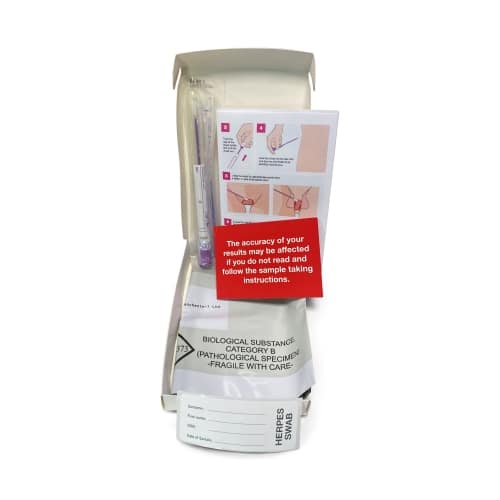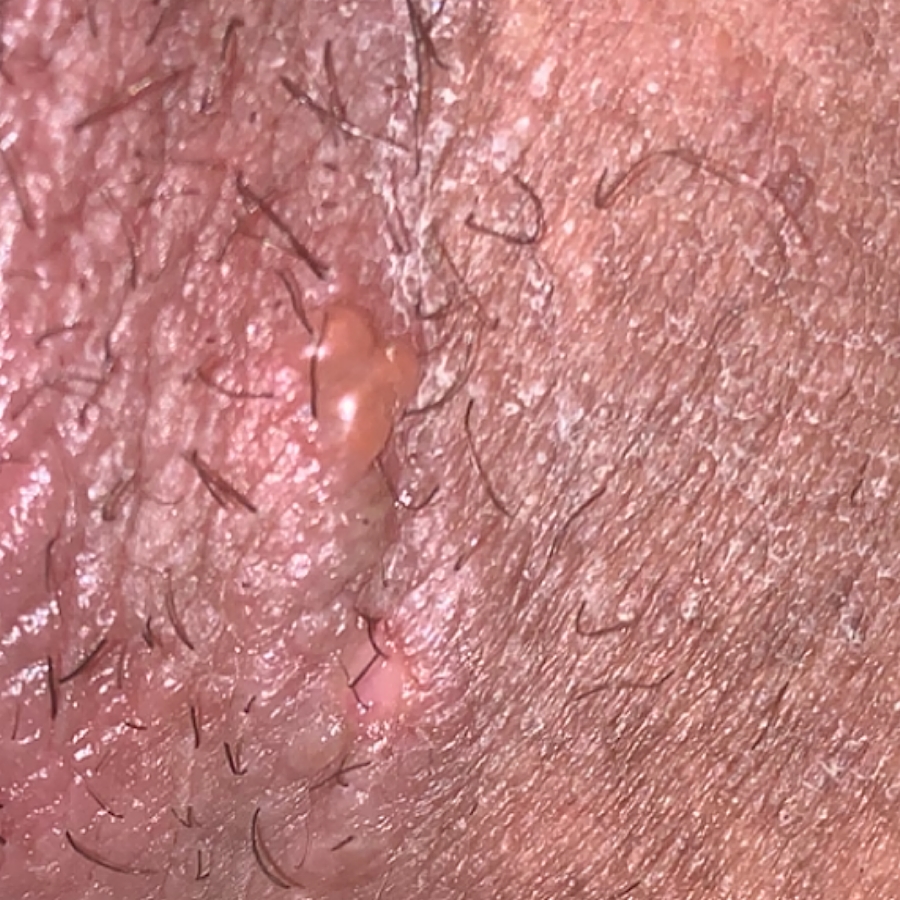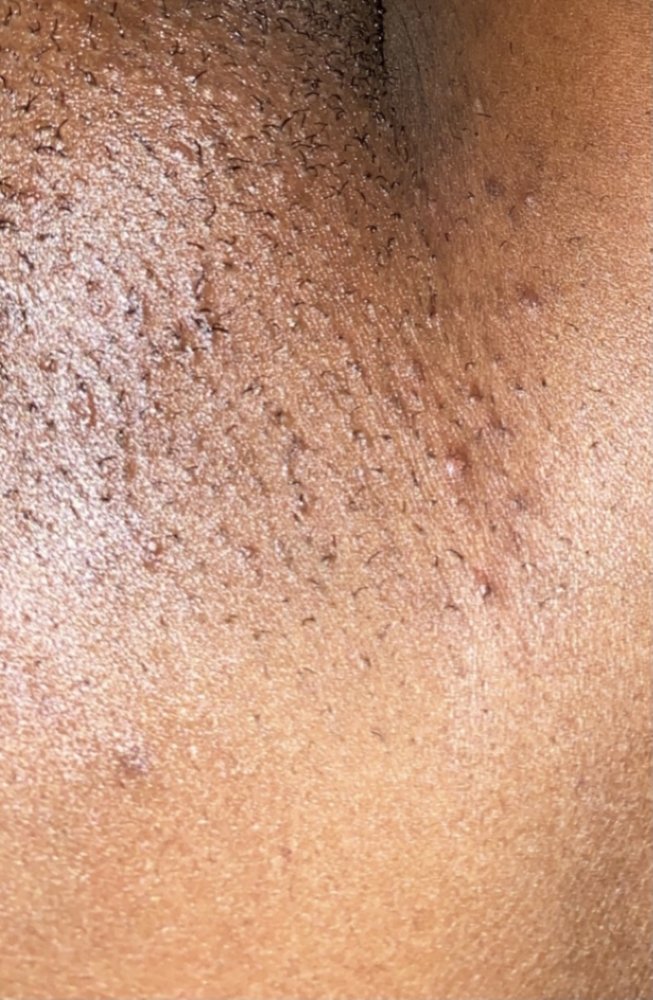How Much Does The Test Cost
The cost of testing for genital and oral herpes depends on the type of test that is performed, where the test is conducted, and whether the patient has medical insurance. Testing is often covered by insurance when ordered by a doctor, although patients may still be responsible for costs such as copays and deductibles.
How Can I Prevent Genital Herpes
If you are sexually active, you can do the following things to lower your chances of getting genital herpes:
- Being in a long-term mutually monogamous relationship with a partner who does not have herpes.
- Using condoms the right way every time you have sex.
Be aware that not all herpes sores occur in areas that a condom can cover. Also, the skin can release the virus from areas that do not have a visible herpes sore. For these reasons, condoms may not fully protect you from getting herpes.
If your sex partner has/have genital herpes, you can lower your risk of getting it if:
- Your partner takes an anti-herpes medicine every day. This is something your partner should discuss with his or her healthcare provider.
The Different Types Of Herpes
Herpes, or the herpes simplex virus, is a highly contagious and common virus that causes cold sores and genital herpes. You may become infected with herpes simplex virus type 1 or herpes simplex virus type 2 . Each type of virus causes unique symptoms, so its important to understand their differences.
Also Check: How Do I Know I Have Genital Herpes
What Should I Do If My Test Results Are Positive
Many at-home services have independent physicians or nurses reach out to people with positive test results. Theyll discuss your results with you and suggest a plan of action, possibly including medication.
If your results are positive, its important to let any recent sexual partners know so they can also get tested.
What To Think About

- Normal test results do not mean you do not have a herpes infection.
- Herpes is often diagnosed by symptoms and by knowing whether the person has had contact with an infected person. Sometimes a test is not needed. A person who has genital herpes needs to learn how to avoid spreading the disease, because the disease is more likely to be spread when he or she has sores. If you have recurrent outbreaks, especially during times of stress or illness, you can also spread the disease.
- You may want to know whether a herpes infection is due to HSV-1 or HSV-2 so you can take steps to prevent or treat outbreaks.
- A genital herpes infection can be spread from a mother to her baby during vaginal delivery. In a newborn, herpes can cause organ failure, brain infection, and death. If active herpes is present near the time of delivery, a caesarean delivery may be done to prevent infecting the baby.
Read Also: How Can I Get Herpes 1
Polymerase Chain Reaction Test
As with the viral culture, your doctor swabs or scrapes a sample from one of your sores. A lab gets the sample and looks for genes from the herpes virus. PCR test results usually come back to you within 24 hours.
Youre more likely to get this test if you have symptoms but its been longer than 48 hours since they showed up. In this case, you can rely on the results from this test more than the viral culture.
Treatment If The Blisters Come Back
Go to a GP or sexual health clinic if you have been diagnosed with genital herpes and need treatment for an outbreak.
Antiviral medicine may help shorten an outbreak by 1 or 2 days if you start taking it as soon as symptoms appear.
But outbreaks usually settle by themselves, so you may not need treatment.
Recurrent outbreaks are usually milder than the first episode of genital herpes.
Over time, outbreaks tend to happen less often and be less severe. Some people never have outbreaks.
Some people who have more than 6 outbreaks in a year may benefit from taking antiviral medicine for 6 to 12 months.
If you still have outbreaks of genital herpes during this time, you may be referred to a specialist.
Also Check: How Do You Catch Herpes Virus
How We Test For Oral & Genital Herpes
Our herpes simplex virus type 1 and 2 type-specific antibody testing looks at the blood for antibodies to bothtypes of the herpes virus through the use of an immunoassay. If enough antibodies are detected, then the tester ispositive for the corresponding virus. Even without signs of an outbreak, our FDA-cleared herpes type 1 & 2 testingwill be 97%-99% accurate between 4-6 weeks post exposure. It will remain 99% accurate after 6 weeks.
Its important to understand that while HSV-2 is often referred to as genital herpes, and HSV-1 is commonly known asoral herpes, both can be located on either region of the body. A positive result for HSV-1 does not always mean aperson has oral herpes, nor does a positive result for HSV-2 mean someone has genital herpes.
Finding a lab is as simple as entering your zip code and selecting thelab that is most convenient for you. You pay online and can get tested as early as that same day.
Herpes I & II
What Is Herpes Simplex
Herpes simplex is a virus that causes skin infections. The infection lasts your lifetime, and it causes painful or itchy sores and blisters that come and go. Herpes simplex virus typically doesnt cause severe problems. But it can be dangerous in infants and people with weakened immune systems. There are two types of herpes simplex:
- Herpes simplex 1 tends to affect your mouth or face. It causes cold sores. HSV-1 spreads through contact with saliva .
- Herpes simplex 2 is a sexually transmitted disease . It causes sores on skin that comes in contact with the genitals of an infected person.
Sometimes a herpes infection can affect other parts of your body, such as your eyes or other parts of your skin.
Also Check: How To Know If You Have Herpes Outbreak
Is There A Cure Or Treatment For Genital Herpes
There is no cure for genital herpes. However, daily use of antiviral medicines can prevent or shorten outbreaks. Antiviral medicines also can reduce the chance of spreading it to others.
Though several clinical trials have tested vaccines against genital herpes, there is no vaccine currently available to prevent infection. One vaccine trial showed efficacy among women whose partners had HSV-2, but only among women not infected with HSV-1. Efficacy was not observed among men whose partners had HSV-2. Another trial testing the same vaccine showed some protection from genital HSV-1 infection, but none from HSV-2.
How To Prevent The Spread Of Herpes
Although herpes is a lifelong virus that cant be cured, it goes through periods of dormancy between outbreaks. This means that while the virus is still present, its not actively replicating.
During this time, you may not experience any signs or symptoms of having the disease even if youve had a previous outbreak before.
However, you can still spread the herpes virus to your sexual partners at any time, even if no sores are present. In addition, although rare, its possible to spread oral herpes to the genital region and vice versa.
For this reason, its extremely important to be mindful of the following preventive measures:
- Tell your partners that you have genital or oral herpes. This allows them to make informed decisions about their own sexual health, and its the responsible thing to do.
- If youre experiencing the signs and symptoms of an upcoming outbreak, avoid all sexual contact. Youre most likely to spread the virus to others during an outbreak.
- Its possible to spread the herpes virus even without an outbreak. If youre worried about spreading the disease to a partner, research shows that antivirals are effective at reducing this possibility.
Having oral or genital herpes doesnt mean that you can no longer have sex. However, its your responsibility to prevent the spread of herpes to your sexual partner.
If you have herpes, you can still take care of your sexual health through open communication and safer sex.
You May Like: Can You Get Rid Of Herpes Type 2
Is There Anything Else I Should Know
Herpes can make people more susceptible to HIV infection. The skin lesions give other sexually transmitted diseases , including HIV, openings for entering the body. Likewise, it can make HIV-infected individuals more infectious. Infection with HSV can also increase HIV viral load. HSV-2 infection is a significant opportunistic infection in HIV-infected individuals due to immune system deficiencies up to 90% of HIV-infected individuals are co-infected with HSV-2.
How Does Genital Herpes Affect Pregnancy

Herpes simplex virus doesnt affect fertility or your ability to conceive. Pregnant women diagnosed with HSV-2 should start a daily antiviral at 36 weeks of pregnancy as prescribed, to prevent outbreaks during delivery. If you have an active infection at the time of childbirth, you can pass the herpes virus to your baby. Neonatal herpes puts a baby at risk for blindness, brain damage, skin infections and death. Your healthcare provider will perform a cesarean section to lower this risk.
You May Like: Is Hpv And Herpes The Same Thing
When Should You Get Tested
The best time to get tested for herpes varies, depending on what’s happening.
If you’re exhibiting symptoms of an initial outbreak which include pain, itching and redness of the affected location fatigue, fever and chills and, ultimately, painful sores or ulcers it’s best to see a healthcare professional about getting tested.
However, if you think you’ve been exposed to the virus and aren’t yet exhibiting symptoms, HSV may take some time before being able to show results on a test. While the exact time frame is unknown and varies from person to person, two weeks is usually enough time to yield accurate test results.
Most people become concerned about being infected with the herpes virus after contact with a potentially infected person. Often, simple things like kissing someone with a visible cold sore or facial acne around the lips can cause concern about HSV-1.
For genital herpes, most people become concerned about potentially being infected after sexual contact with a person that shows symptoms of herpes. This can include oral sex with someone that has cold sores, which can potentially spread to the genitals.
Since herpes is asymptomatic in many people, you could be infected with the virus even if you dont have any symptoms.
When Should I Get A Genital Or Oral Herpes Test
Testing for the viruses that cause genital and oral herpes may be ordered when a patient develops signs and symptoms of a herpes infection. Although many people who contract HSV never notice symptoms, signs of an initial infection appear 2 to 20 days after infection and depend on the type of HSV causing the infection.
When signs and symptoms of an initial infection occur, they may include:
- Small sores on the skin
- Tingling, itching, or burning on the skin
- Fever, headache, or body aches
- Swollen lymph nodes
After the initial infection, HSV remains dormant inside of the body. HSV can reactivate throughout a patients life, causing symptoms of genital or oral herpes to reappear. While the trigger for an HSV outbreak is often unknown, potential triggers include a fever, stress, physical trauma, and a suppressed immune system.
Generally, expert organizations do not recommend herpes testing for patients without symptoms. An exception may be made for certain patients, including:
- Patients who have a partner with genital herpes
- Patients seeking a more complete STD test panel, including people with multiple sexual partners
- Babies born to a mother who has HSV
You May Like: What Temperature Kills Herpes Virus
Genital Herpes Treatment In Pregnancy
You may be offered antiviral treatment:
- to treat outbreaks in pregnancy
- from 36 weeks to reduce the chance of an outbreak during birth
- from diagnosis until the birth if you first get herpes after 28 weeks of pregnancy
Many women with genital herpes have a vaginal delivery. You may be offered a caesarean, depending on your circumstances.
How To Test For Herpes
If you suspect you have herpes, the first thing you should do is contact your healthcare provider. Your healthcare provider can examine your blisters or sores to check for herpes. If you do have an HSV infection, your healthcare provider may recommend a treatment plan for you.
The Center for Disease Control recommends a genital herpes test if you have symptoms of herpes or a sexual partner who has genital herpes . Note that some people have asymptomatic herpes and donât show symptoms, but the CDC does not recommend asymptomatic screening for herpes .
If you would like an easy at-home option to test for 6 other common STIs, try the Everlywell home STD Test for women or the STD Test for men which checks for chlamydia, gonorrhea, hepatitis C, HIV, syphilis, and trichomoniasis. Once your sample is received and analyzed at the lab, the test results are sent to you quickly and discreetly via our secure, online platform.
Read Also: How To Deal With Herpes
Whats The Difference Between Hsv
There are two types of HSV. HSV-1 is transmitted through oral contact. You can catch HSV-1 through mouth-to-mouth contact or through oral contact with the genitals. The sores associated with HSV-1 are often referred to as cold sores. Though they typically appear around the mouth, HSV-1 can also cause genital herpes.
HSV-2 is a sexually transmitted infection that primarily impacts the genitals. HSV-2 is spread through contact with the genitals, skin, fluids, or sores of someone with the virus. If HSV-2 comes into contact with the oral membranes, it may also cause sores on the mouth. Both types of herpes may spread even when symptoms are not evident and are lifelong viruses with no cure.
How Common Herpes Really Is
Enough people have herpes to make it a totally commonplace infection, even though we may not treat it as one.
Nearly 48 percent of people aged 14 to 49 in the United States were estimated to have HSV-1 between 2015 and 2016, according to the most recent data from the CDC. This high prevalence makes sense because many people actually get the virus from nonsexual contact as children, the CDC explains. This can happen when a parent greets a child with a kiss on the mouth or while a kid is playing with other little ones, since children arent exactly known for their respect of personal space. Remember: HSV-1 often presents as cold sores, but its possible that some people with HSV-1 actually have genital herpes.
So, about genital herpes. You may have heard that one in six people has this infection. Thats a little bit of an outdated figure, Christine Johnston, M.D., an associate professor and herpes researcher at the University of Washington School of Medicine, tells SELF. That number is related to national survey data released by the CDC in 2010 and based on the years 2005 through 2008. This nationally representative research, published in the CDCs 2010 National Health and Nutrition Examination Survey , tested peoples blood samples for antibodies of HSV-1 and HSV-2, estimating that 16.2 percent of Americans aged 14 to 49 had HSV-2 between the years 2005 and 2008. Thats around one in six.
Recommended Reading: How To Heal Herpes Outbreak Naturally
Why The Test Is Performed
The test is done to find out whether a person has ever been infected with oral or genital herpes. It looks for antibodies to herpes simplex virus 1 and herpes simplex virus 2 . An antibody is a substance made by the bodys immune system when it detects harmful substances such as the herpes virus. This test does not detect the virus itself.
You May Like: What Are The Long Term Effects Of Herpes
Will I Have To Pay For The Test Out Of Pocket

Youll have to check with your insurance network to see whether at-home STI tests are covered.
Insurance does typically cover them, but sites like Everlywell recommend verifying the purchase with your insurance.
Additionally, some networks may reimburse you for your purchase.
However, most at-home testing sites arent currently partnered with any insurance companies, which means youll have to reach out yourself.
If you dont have insurance, youll likely have to pay for the test out of pocket. Some sites like Priority STD dont accept insurance, so its a flat rate of $99 regardless of your coverage.
Also Check: How To Not Catch Herpes
Who Might Get Herpes Simplex
People of any age can contract herpes simplex. You are more likely to get the virus if you:
- Were assigned female at birth.
- Have had multiple sex partners.
- Started having sex at a young age.
- Have a history of any sexually transmitted infection .
- Have a weakened immune system.
- Dont use condoms for intercourse and dental dams for oral sex.
Who gets HSV-1, commonly known as oral herpes?
Anyone can get HSV-1. Most people contract HSV-1 during childhood. It spreads when an adult who has the virus has close contact with a child, such as when a family member kisses a child.
Who gets HSV-2, commonly known as genital herpes?
Genital herpes affects sexually active teens and adults of all genders and races. It can spread if you have multiple sexual partners and dont use condoms or dental dams.
People assigned female at birth are more at risk. Delicate vaginal tissue can tear, making it easier for the infection to get in. Black people who were AFAB are especially vulnerable, with an estimated 1 in 2 people AFAB between the ages of 14 and 49 infected with HSV-2.